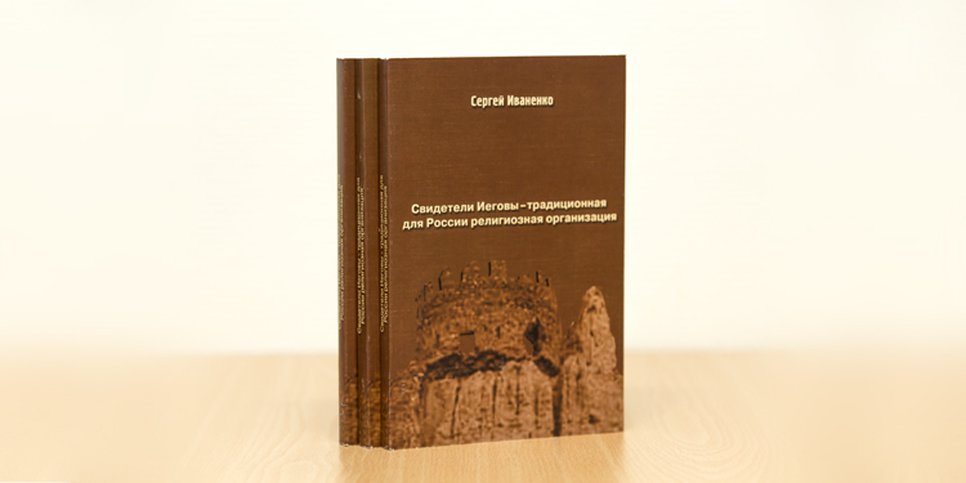Ivanenko S. Jehovah's Witnesses — A Traditional Russian Religious Organization
Full text of the book in PDF format (17 MB)
INTRODUCTION
The socio-economic transformation of Russian society, which began in the mid-80s of the XX century, led to significant changes in the religious life of the country, one of the aspects of which was the increase in the number of the religious organization of Jehovah's Witnesses. In a relatively short period of time, Jehovah's Witnesses turned from a relatively small religious organization operating underground into a large religious association, one of the most numerous movements of late Protestantism in Russia.
The authors of works devoted to criticism of the ideology and activities of Jehovah's Witnesses published in the former USSR were forced to take into account the assessment of this religious organization, contained, in particular, in a note by the Ministry of State Security of the USSR to J. V. Stalin, in which Jehovah's Witnesses were characterized as an "anti-Soviet sect", used in publications throughout most of the Soviet period.
Under the influence of the negative attitude towards the religious organization of Jehovah's Witnesses on the part of the authorities, the version that the doctrine of Jehovah's Witnesses and this religious organization itself was created on the direct instructions of the imperialist bourgeoisie with the aim of opposing the world revolutionary movement and the socialist system became widespread in atheistic publications. At the same time, in the most informative works published during the Soviet period, the social origins of the doctrine of Jehovah's Witnesses were analyzed, they contained valuable factual material characterizing the forms and methods of ideological work with the followers of this religious organization.
At the end of the 80s, religious scholars attempted to summarize the main results of the evolution of Protestant communities in the USSR, and within the framework of the research, the situation of Jehovah's Witnesses was also analyzed. According to the results obtained, the Protestant communities in the USSR intensively lost their sectarian characteristics.
The conclusion that the Protestant communities in the USSR gradually lost the features typical of sectarian religious organizations and that this process to a certain extent affected the communities of Jehovah's Witnesses in the USSR, seems important and methodologically fruitful for assessing the ideology and activities of Jehovah's Witnesses in subsequent years, after the collapse of the USSR, in conditions of freedom of conscience.
In the 90s of the XX century, two approaches began to dominate in the study of the ideology of Jehovah's Witnesses: the first is scientific, religious studies and the second approach, confessional-accusatory, based on the principles of the so-called "anti-cult movement".
The study of the religious organization of Jehovah's Witnesses from a scientific and religious perspective was carried out by V. I. Garadzha, N. S. Gordienko, I. Y. Kanterov, the staff of the Department of Religious Studies of the Russian Academy of Public Administration under the President of the Russian Federation (in 1994-2002 headed by Prof. N. A. Trofimchuk) and other researchers. Their textbooks and reference books and other publications contained an objective assessment of the religious organization of Jehovah's Witnesses as one of the later movements in Protestantism.
In 2000, one of the first monographs in post-Soviet Russia was published containing objective religious information about the religious organization of Jehovah's Witnesses - the book "Russian Jehovah's Witnesses: History and Modernity" by the famous Russian religious scholar N. S. Gordienko.
As N. S. Gordienko argues, Jehovah's Witnesses are "a normal religious organization - a confession," and it should be treated with the same tolerance as other confessions and denominations that legally exist in Russia and operate within the framework of the Constitution of the Russian Federation.
The second approach to assessing the religious organization of Jehovah's Witnesses was formed on the basis of the so-called "anti-cult movement", which is an alliance of heterogeneous confessional, political and other forces that oppose the application of the principle of equality of all religious organizations before the law to those religious movements that are arbitrarily, regardless of scientific religious criteria, declared "totalitarian sects." Works based on the use of such categories as "totalitarian sects", "destructive cults", etc., as a rule, do not contain objective and reliable information, including about the ideology and activities of the religious organization of Jehovah's Witnesses, and can provoke interfaith confrontation.
It is essential that some religious organizations are formed as a denomination from the very beginning of their emergence, while others turn into a denomination, transforming from other types of religious organizations. As this book shows, a religious organization of Jehovah's Witnesses (Bible Students) can be characterized as an organization that has been a denomination since its inception and throughout its evolution.
In working on this topic, the author used archival materials, including the current archive of the Administrative Center of Jehovah's Witnesses in Russia, scientific literature, as well as theological works and publications in the publications of the Watch Tower Society devoted to the history and current state of the religious organization of Jehovah's Witnesses in the former USSR and in Russia, the authors of which, being participants in the most important events in the history of Jehovah's Witnesses, seek to explain it from the point of view of the Bible and reveal the main content of the preaching activity of Jehovah's Witnesses in different periods.
The attitude towards Jehovah's Witnesses on the part of society and the state remains ambiguous at present. Some consider them a dangerous sect, others a Christian religious organization that educates believers in accordance with biblical principles. The main purpose of this book is to help those who would like to form their own opinion based on the facts studied by religious studies to understand the real situation.
